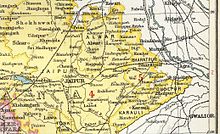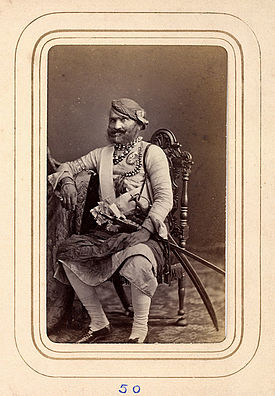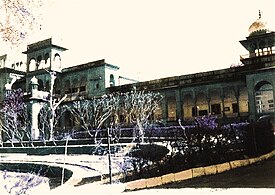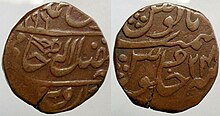Dholpur state
This article needs additional citations for verification. (May 2022) |
| Dholpur State | |||||||||
|---|---|---|---|---|---|---|---|---|---|
| 1805–1949 | |||||||||
 Dholpur State in the Imperial Gazetteer of India | |||||||||
| Capital | Dholpur | ||||||||
| Government | |||||||||
| • Type | Sovereign monarchy (1805–1818) Princely state (1818–1947) Constitutional monarchy (1947–1949) | ||||||||
| Maharaj Rana | |||||||||
• 1805–1835 | Kirat Singh (first) | ||||||||
• 1911–1949 | Udai Bhan Singh (last) | ||||||||
| History | |||||||||
• Established | 1805 | ||||||||
| 1949 | |||||||||
| |||||||||
| Today part of | India · Rajasthan | ||||||||
Dhaulpur State or Dholpur State, was an independent kingdom from 1805 to 1818 and a princely state under British suzerainty from 1818 to 1949 in eastern Rajasthan. It was founded by Rana Kirat Singh, ruler of Gohad in 1805 AD. The state was merged into the Union of India in April 1949 and Udai Bhan Singh was the last Maharaj-Rana of Dholpur.[1][2]
History
[edit]

Dholpur State, located in present-day Dholpur district of Rajasthan, was established due to British political intervention in Rajputana during the early 19th century. Initially, the region was under the control of the Scindias of Gwalior. However, after their defeat by the British East India Company at the Battle of Laswari in September 1803, the British took over the area.
To create a buffer between the Kingdom of Bikaner and the Marathas, who often allied against them, the British supported the Jats led by Rana Kirat Singh. Jats helped the britishers to reclaim the Gohad region from the Scindias. As part of an agreement, Rana Kirat Singh was given control of Dholpur, while the British took over Gohad. Thus, Dholpur State was formed, and Rana Kirat Singh was declared its ruler in 1805.[3]
The last ruler of Dholpur signed the instrument of accession to the Indian Union on 7 April 1949 and the state was merged in Matsya Union.[4]
Vasundhara Raje, former chief minister of Rajasthan, was a member of the erstwhile ruling family of Dholpur as she was married to Maharaja Hemant Singh before getting divorced.

See also
[edit]- Gohad State—For early history of Dholpur rulers
References
[edit]- ^ Rudolph, Susanne Hoeber; Rudolph, Lloyd I.; Singh, Mohan (1975). "A Bureaucratic Lineage in Princely India: Elite Formation and Conflict in a Patrimonial System". The Journal of Asian Studies. 34 (3): 717. doi:10.2307/2052551. ISSN 0021-9118.
Bharatpur and Dholpur was the Jat states.
- ^ John Zubrzycki (2012). The Mysterious Mr Jacob. Random House India. p. 3. ISBN 9788184003369.
- ^ "Battle of Dholpur in 1803". amritmahotsav.nic.in Government of India. “ The emergence of Dholpur State, in the present-day Dholpur district of Rajasthan, was a result of the British political intervention in Rajputana during the early nineteenth century. It was the harsh conquest and annexation policy of the East India Company’s which led to the creation of the state of Dholpur. Initially, it was under the rule of the Scindias of Gwalior. They lost possession of the region following their defeat in the battle of Laswadi in September 1803 against the forces of the Company led by General Lake. In creating the state of Dholpur, the British built a buffer between the kingdom of Bikaner and the Marathas, both of whom often formed an alliance against them. At the same time, the British also helped the Jats led by Rana Kirat Singh, to win the Gohad region from the Scindias. As part of an arrangement made by the Company, Rana Kirat Singh was given Dholpur and the former took over Gohad. Thus, the Dholpur state was formed and Rana Kirat Singh was declared its ruler in 1805.”
- ^ "Dholpur Princely State (15 gun salute)". Archived from the original on 14 January 2015. Retrieved 28 June 2014.
External links
[edit] Media related to Dholpur State at Wikimedia Commons
Media related to Dholpur State at Wikimedia Commons- Genealogy of the rulers of Dholpur
- Princely States of India A-J
- States and territories established in 1805
- States and territories disestablished in 1949
- Princely states of Rajasthan
- Dholpur district
- States under the Rajputana Agency
- States and territories established in the 700s
- States and territories established in 1806
- 1st-century establishments in India
- 1806 establishments in British India
- 1949 disestablishments in India


